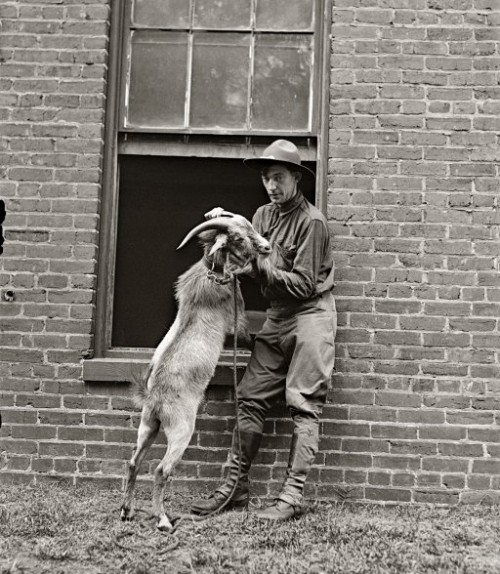Animals
Cross-Critter Adoption
No, this isn't a story about AJ & BP, and, I know stories about some critter adopting another critter of unlike origin isn't exactly "weird" any more. In fact, my aunt had a dalmatian that raised more kittens than her cats ever did, but this story has a new wrinkle that may gain it entry to the Cutest Video Hall of Fame.
Posted By: Expat47 - Sat Aug 11, 2012 -
Comments (2)
Category: Animals
Raccoon Roadkill Gets Makeover
Be careful in Philadelphia. If you get run down, the road crew may decide you need another coat.
It may be the new look for someone on the road.
Here's the link about the "yellow raccoon road".
http://www.huffingtonpost.com/2012/08/09/crew-paints-over-raccoon-roadkill_n_1762060.html?ref=topbar#slide=1356733
Posted By: gdanea - Fri Aug 10, 2012 -
Comments (13)
Category: Animals
The sound of copulating flies
In order to test the theory that noisy copulating animals are at greater risk of being found and eaten by predators, German researchers mounted "dead, noiseless fly pairs" on the ceiling of a shed. The bats that lived in the shed ignored them. But when the researchers played the sound of copulating flies through loudspeakers, the bats attacked the loudspeakers. So, theory proven!Max-Planck-Gesellschaft has a video of the bats attacking the speakers, but unfortunately the video has no sound. And below is a youtube video of some copulating flies -- but again, you can't hear the flies, just some people in the background. So I still don't know what copulating flies sound like.
Posted By: Alex - Fri Jul 27, 2012 -
Comments (3)
Category: Animals, Insects and Spiders, Science, Experiments, Sexuality
How many people will run over a turtle?
Mark Rober, who apparently works at NASA, has posted an interesting video about what he calls his "roadkill experiment." It explores how many people will swerve into the shoulder lane to deliberately run over an animal, such as a turtle, snake, or tarantula. No real animals were harmed. He used rubber ones.The results: Most people ignored the animals, but one person swerved to hit the turtle, and slightly more swerved to hit the snake and spider. What does this tell us about human nature? Perhaps that most people are basically decent, but there are definitely a few psychos out there. (via Gizmodo)
Posted By: Alex - Sat Jul 21, 2012 -
Comments (11)
Category: Animals, Evil, Violence
How to anesthetize a hippo
Science Daily reports that progress has been made on the problem of how to anesthetize a hippopotamus:The solution involves "a new anesthetic protocol based on the use of two non-opiate drugs." This protocol was experimentally tested on 10 hippos, all of which "recovered rapidly and completely from the procedure and showed no lasting after-effects."
The interesting detail left out of the Science Daily article, but which can be found in the original article in the Journal of the American Veterinary Medical Association, is that all 10 hippos were castrated while asleep. If they had woken up while that was happening, I'm sure they really would have been angry!

Posted By: Alex - Mon Jul 09, 2012 -
Comments (4)
Category: Animals, Medicine, Surgery
Music-Loving Peacocks of Budapest
-Ciba Symposia, Feb 1942, p.1150.
The Budapest Zoo is still hosting evening concerts, almost eighty years later, and according to the Budapest Times, the zoo's peacock still enjoys the music:

(image source)
Posted By: Alex - Mon Jul 02, 2012 -
Comments (6)
Category: Animals, Music
A gecko eaten by ants
Posted By: Alex - Sun Jul 01, 2012 -
Comments (5)
Category: Animals, Insects and Spiders
Ichimonji, the donkey with dentures
Ichimonji was a donkey that served in the Japanese army during World War II, carrying munitions and wounded soldiers. After the war, he ended up at the Tokyo Zoo. But by 1963, in his old age, he had lost most of his teeth, which made it hard for him to eat. So Kenji Ishigami, a professor of Dentistry at Tokyo University, took pity on him and made him a set of artificial teeth out of a special alloy metal. He was reported to be the first donkey in the world ever to have dentures. Because of his new teeth, he became a star attraction at the zoo until his death in 1965.


Posted By: Alex - Fri Jun 22, 2012 -
Comments (7)
Category: Animals
Follies of the Mad Men #184


Are those two frosty ones in your pouch, or are you just "hoppy" to see me?
Original ad here.
Posted By: Paul - Sat Jun 02, 2012 -
Comments (2)
Category: Animals, Business, Advertising, Products, 1950s, Alcohol
William Hamilton Bones, Washington Goat

Here is a picture of a goat who came to live among high-powered Washington, DC, politicians in the year 1929.

You can read the full story of the goat's dazzling ascent to power here.
But like many Washington insiders, he had an unwholesome addiction that led to his downfall. Find out what it was here.
I think we need a goat today in DC to add a proper sense of absurdity to proceedings.
Posted By: Paul - Mon May 28, 2012 -
Comments (6)
Category: Animals, Pets, Politics, 1920s

| Who We Are |
|---|
| Alex Boese Alex is the creator and curator of the Museum of Hoaxes. He's also the author of various weird, non-fiction, science-themed books such as Elephants on Acid and Psychedelic Apes. Paul Di Filippo Paul has been paid to put weird ideas into fictional form for over thirty years, in his career as a noted science fiction writer. He has recently begun blogging on many curious topics with three fellow writers at The Inferior 4+1. Contact Us |




